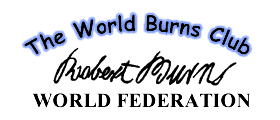To Mrs Frances Anna Dunlop of Dunlop
Edinburgh, 15th January 1787Madam,Yours of the 9th current, which I am this moment honoured with, is a deep reproach to me for ungrateful neglect. I will tell you the real truth, for I am miserably awkward at a fib: I wished to have written Dr. Moore before I wrote tom you; but though, every day since I received yours of Dec 30, the idea, the wish to write to him, has constantly pressed on my thoughts, yet I could not for my soul set about it. I know his fame and character, and I am one of” the sons of little men.” To write to him a mere matter-of-fact affair, like the merchant’s order, would be disgracing the little character I have; and to write the author of The View of Society and Manners, a letter of sentiment – I declare every artery runs cold at the thought. I shall try, however, to write to him tomorrow or nest day. His kind interposition on my behalf I have already experienced, as a gentleman waited on me the other day, on the part of Lord Eglinton, with ten guineas, by way of subscription for two copies of mu next addition.The word you object to in the mention I have made of my glorious countryman and your immortal ancestor, is indeed borrowed from Thomson; but it does not strike me as a improper epithet. I distrusted my own judgement on your finding fault with it, and applied for the opinion of some of the Literati here, who honour me with their critical strictures, and they all allow it to be proper. The song you ask, I cannot recollect, and I have not a copy of it. I have not composed any thing on the great Wallace, except what you have seen in print, and the inclosed, which I will print in this edition. You will see that I have mentioned some others of the name. When I composed my Vision long ago, I had attempted a description of Koyle, of which the additional stanzas are a part, as it originally stood. My heart glows with a wish to be able to do justice to the merits of the Saviour of his Country, which, sooner or later, I hall at least attempt.You are afraid that I shall grow intoxicated with my prosperity as a poet. Alas! Madam, I know myself and the world too well. I do not mean any airs of affected modesty: I am willing to believe that my abilities deserve some notice; but in a most enlightened, informed age and nation, when poetry is and has been the study of men of the first natural genius, aided with all the powers of polite learning, polite books, and polite company - to be dragged forth to the full glare of learned and polite observation, with all my imperfections of awkward rusticity and c rude unpolished ideas on my head – I can assure you, Madam, I do not dissemble when I tell you I tremble for the consequences. The novelty of a poet in my obscure situation, without any of those advantages which are reckoned necessary for that character, at least at this time of day, has raised a partial tide of public notice, which has borne me to a height where I am absolutely feelingly certain my abilities are inadequate to support me; and too surely do I see that time when the same tide will leave me, and recede, perhaps, as far below the mark of truth. I do not say this in the ridiculous affection of self-abasement and modesty. I have studied myself, and k now what ground I occupy; and, however a friend
|
|---|


